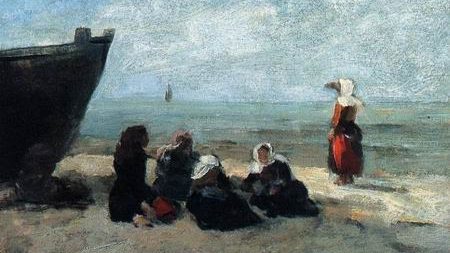Liturgy: “Have mercy upon us, O LORD, have mercy upon us”
Jesus is coming and the reality of his coming pushes NT writers in two different but related directions.

What is the King’s Liturgy? King’s Liturgy defines our experience together as a Christian community. It outlines the rhythms we celebrate with the Church at large: Scripture readings, Sabbath habits, and celebration of Holy Days and historical events.
This Week’s Lectionary Readings
Judges 4:1-7
Psalm 123
1 Thessalonians 5:1-11
Matthew 25:14-30
This week’s liturgy is contributed by Dr. Dominic Zappia, instructor of Biblical studies:
The second coming of Christ is a certain event discussed throughout the New Testament. It appears in the Gospels, Paul’s letters, and the Catholic epistles. Jesus is coming and the reality of his coming pushes NT writers in two different but related directions.
First, Jesus’s coming is good news. The evil in this world will be undone, the broken creation mended, and the oppressed liberated. This is the gospel message we profess and in which we participate. We see this truth reflected in the parable of the talents (Matthew 25:14-30). The main point of the parable is to warn us to be ready for Jesus’s second coming. If we are not prepared, we face judgment.
Conversely, this story teaches us that God has given us work to do. He has entrusted his people with the building up of his kingdom. We are not meant to sit idly and wait for it, but work to expand it now. This includes evangelism—the proclamation of salvation in Jesus’s name—but it also requires the fight for what Jesus calls, “the weightier matters of the law: justice and mercy and faithfulness” (Matt 23:23). It demands, as Matthew 25:31-46 illustrates, that we care “for the least of these my [Jesus’s!] brothers” by giving them food when they are hungry and drink when they are thirsty, by welcoming them when they are strangers and visiting them when they are sick, and by coming to them when they are in prison. We are obliged to do what Paul says in 1 Thessalonians 5:8, “Put on the breastplate of faith and love, and for a helmet the hope of salvation.”
We do this because “we do not wrestle against flesh and blood, but against the rulers, against the authorities, against the cosmic powers over this present darkness, against the spiritual forces of evil in the heavenly places” (Ephesians 6:12). We need to be in the fight—undoing the evil that saturates this world as we await its final defeat in Christ.
This brings us to the second but related point that NT authors make about the Christ’s coming. The return of Christ is a day of restoration but it is also one of judgment. We take comfort in the fact that, as Paul writes in 1 Thess 5:9, “God has not destined us for wrath, but to obtain salvation through our Lord Jesus Christ.” Yet, we need to be mindful of Paul’s charge to “keep awake and be sober” (1 Thess 5:6) because the day of Jesus’s second coming is one of “sudden destruction,” in which no one will escape (1 Thess 5:3).
We do not want to end up like the slothful servant of Matthew 25:14-30, who thought little of his master, claiming him to be “a hard man, reaping where [he] did not sow, and gathering where [he] scattered no seed” (25:24). The end of this servant is expulsion into “outer darkness,” a place where “there will be weeping and gnashing of teeth” (25:30). We must not neglect our work in Christ’s kingdom. To do so could have devastating consequences. On the day of judgment, we may find ourselves saying, “Lord, Lord, did we not prophesy in your name, and cast out demons in your name, and do many mighty works in your name?” with Jesus declaring, “I never knew you; depart from me, you workers of lawlessness” (Matt 7:22-23).
So, let us rejoice in the knowledge that Christ will come again. This world, with its sin and brokenness, will be restored. While we await that day, let us fight the good fight—seeking liberation for the oppressed, healing for the broken, and salvation for the lost. But let us be warned, for Christ is our king, and rejecting him and his kingdom comes with fearful repercussions. Come Lord Jesus, we pray.




